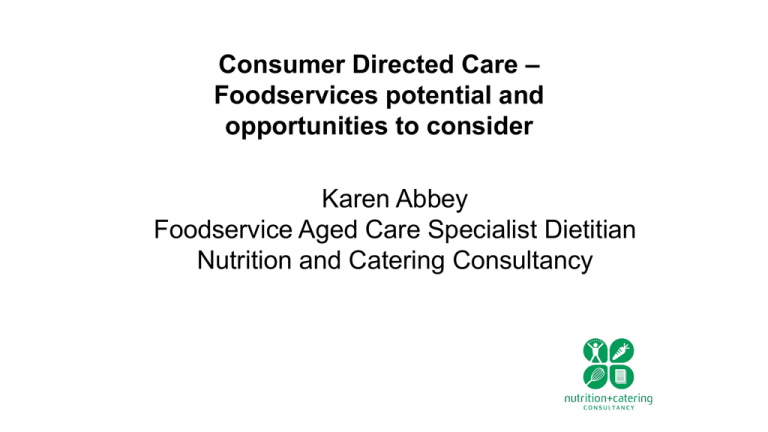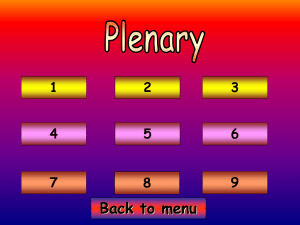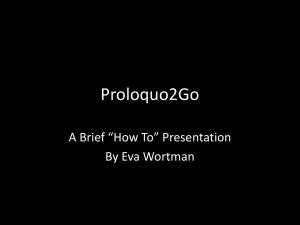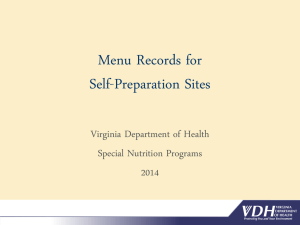Consumer Directed Care * Foodservices potential
advertisement

Consumer Directed Care – Foodservices potential and opportunities to consider Karen Abbey Foodservice Aged Care Specialist Dietitian Nutrition and Catering Consultancy Todays presentation • Consumer directed care (resident) • Community focussed – expectations – aged care • Meeting expectations of residents • Family and friends • Frailer population • Care needs – juggle to balance • Foodservices • What is can provide within finite resources • Menu planning • What can be achieved when catering for a group • Dining rooms • Services and creating a home environment Consumer Directed Care • Developing model • Community expectations will continue to increased and the desire to maintain level of service control will be transposed into the residential age care sector • People coming into care are more information aware and this is where increase service expectations will be driven from • Choice and Flexibility Foodservices Meeting the expectations Government increasing services into the community - occupancy of aged care homes is changing Higher care level but still wanting choice and flexibility Expectation of family, friends to maintain service levels - buy in Menu in aged care is a key selling point Food is individualised and is one of the controlling factors for residents/family/friends Do more with less – resources Aged Care Home Primary goal Aged Care Std Food Safety Nourishment and hydration Quality of life Menus and food in aged care is experiencing more awareness and the standard being raised Challenge’s in the home • Complexity of residents – – – – – Multiple health issues Increase needs and behaviour Residents that cannot communicate Shorter length of stay Full assistance – high care needs • Meeting compliance with expected outcomes – Time consuming and you need good systems – Detracts from resident care • Providing more choice and flexibility – How far can a foodservice system stretch to meet the needs of all residents every day – Is it feasible – what is realistic? – Manage the risk for food safety in providing choice and flexibility Foodservices Choice - the type of services foodservices will provide and how residents can engage in their food supply Flexibility - on the types of services offered how and when How does foodservices support these two concepts • Menu • Meal delivery system • Dining room services Menu • • Menu underpins all foodservice operations Menu flexibility is defined by your menu pattern in choice offered in the day • Providing enough variety • How often a menu is changed • • Seasonality Resident involvement • Often the menu for a resident is the sole source of nutrition -variety, yummy foods, with some change • Meeting the needs of individual residents • Multicultural menu planning aspects Menu pattern • What suites individual facilities • Residents are very happy with one choice or don’t what to make choices or want more choices • Meeting the 200,000’s food preferences/like and dislikes • Using the menu to create excitement and fun Multicultural menu planning • This is tricky to meet the expectations of all residents • • • • Often residents will try to adjust to new foods May stop eating Feel socially displaced Menu solutions • • • • • Ready made meals (frozen) Multi option menu – using stables to enhance the menu pattern Cook-freeze technology to make extra meals and put aside Substituting with meal alternatives when the menu is unable to accommodate food preferences Other resident may find the different meals appealing and want to try Goal of any facility (foodservices) getting food into our residents Ready made meals/meal components Meal presentation • • • • • • Height adds a sense of style Colour combination Texture modified meals Showing the care and detail Garnishing Individual portions Menu choice • This is essential for quality of life and care • Everyone like to have some control over the foods eaten • Food choice has been linked to better food intake • Menu choice close to point of service is ideal • • • Resident often forget what they order Or see what another resident has and changes their mind Reduces the time taken to collate orders by foodservices Meal services – point of service Portion size (meal size) Flexibility to change food options Forecasting models Seconds • Tray service detract from this as they reduce the flexibility and choice • Find way to increase choice and flexibility with this service model Foodservices – meal delivery systems • • • • Buffet style Room service model – breakfast cart Cafeteria type services – texture modified meal Choice options on the table for meal and mid-meal snacks • Adds engagement, choice and surprise to your menu Dining rooms • • • • Meal service design Nicely set up dining rooms Staggered meal services Extended meal service time • Adequate nutrition • • Amount of time residents are spending in their rooms Service designs are fine so long as residents are eating and drinking enough food and fluids Managing expectations • Resident suggestions and trends • Look at current service design • If you want to change services what system need to be changed – best outcomes (resources) • The market influences service design and we see this is already starting to occur – extra services • The menu and foodservices forms one of the most important aspects to a home and therefore it is a primary piece to consider • Design of buildings and services is a major factor to consider • The most important questions to ask is what kind of services do you want residents to have? • Creates the profile for design around residents – Meet their nutritional needs – Quality aspects of foodservices – Meal environment enhances quality of life Opportunity • • • • • There is so much to gain from a proactive and responsive foodservices This is a challenge and requires the will of the organisation to change from institutional models – find the space, resources and time Change service models to create the space to expand on the possibilities, create efficiency which can open up resources to allow for modifications in the future Use technology to assist – work smarter and manage information easier to enhance care To offer choice and flexibility may be as simple as • • • • • Meal cart to offer soups with hot bread rolls, different sandwiches, desserts Placing a plate of food in the centre of a table – sandwiches choices Having different choice options for mid-meal snacks Responsive menu information system Efficient way to deliver meals to residents • Making foodservices homely and engaging Contact details Invited to join Nutrition and Catering Global subscribe www.nutcat.com.au • • • • Foodservice consultant Training and workshop Menu planning/review and support services Foodservice Industry Consultant Karen Abbey Foodservice and Aged Care Specialist Dietitian 0417 608 206 nacc@live.com.au www.nutcat.com.au




